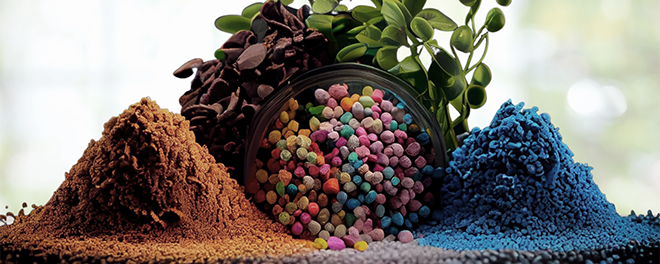
The group of biopolymers includes, on the one hand, organic plastics obtained from renewable sources such as sugar cane, corn starch, or cellulose. In contrast to products made from finite raw materials such as petroleum, so-called "bio-based polymers" are considered sustainable materials. However, a prerequisite for their sustainability is that the cultivation of the raw materials takes place under the most ecological criteria possible. On the other hand, the term biopolymer also refers to plastics that are biodegradable. This means that they decompose independently and completely under certain conditions. At least one of these two criteria must be met for the term biopolymer to be applied.
Biopolymers are particularly popular because of their good CO2 balance, but more so with consumers than with processors. Many plastics processing companies are afraid of biopolymers because they are not able to assess the suitability of the material well enough, or because they assume that procurement will be difficult. These prejudices do not apply.
In fact, biopolymers can be used in many different ways. In particular, in the packaging industry they are suitable for the production of environmentally friendly disposable or reusable packaging. But biopolymers are also increasingly used in agriculture, medicine, and the textile industry. They are even being used in the automotive industry.
And what about availability? “There is currently a global market volume of around two million metric tons of biopolymers, and the trend is upward”, says Andreas von Dorn, Research & Development Engineer at Meraxis. At Meraxis, customers receive biopolymers as well as compounds. “We are constantly expanding our partnerships to secure far-reaching volumes for our customers. Even though not every company wants to switch to biopolymers, it is important for us to have the broadest possible portfolio of sustainable material alternatives. This portfolio allows us to work with our customers to create a customized material solution.“
The use and compounding of biopolymers require comprehensive process engineering know-how. Processors need to know, for example, under which conditions the materials decompose – for example, through solar radiation, water, acid, or other factors. Meraxis therefore advises customers on all aspects of the use and processing of bio-based polymers. Our team also works closely with the Institute for Circular Economy of Bio:Polymers at Hof University of Applied Sciences. In addition to the development of natural bioplastics and biogenic additives, the focus is on the modification of biopolymers as well as processing from compounding to extrusion and injection molding processes.
Are you interested in the use of biopolymers? Get in touch with Andreas von Dorn.